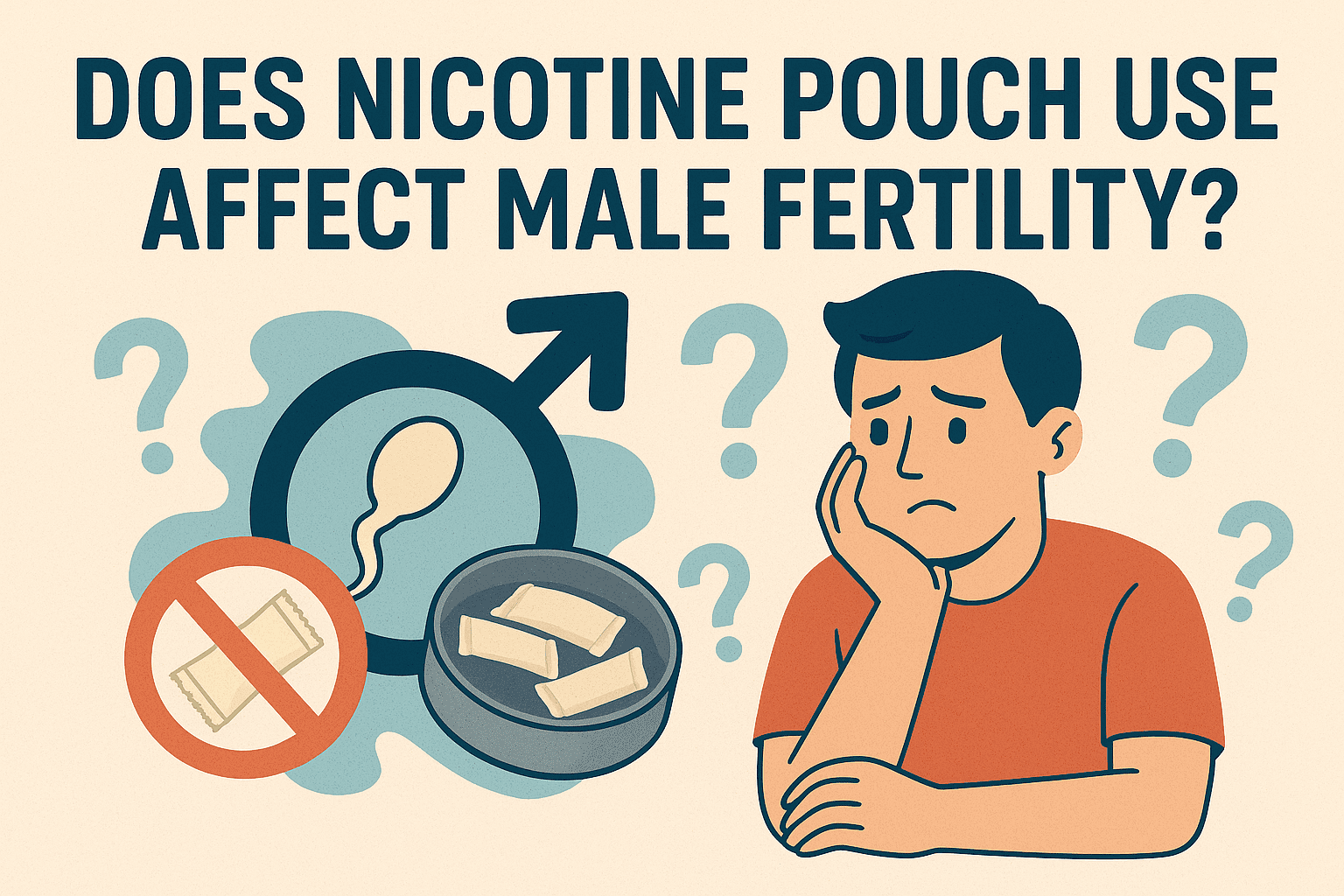
Does Nicotine Pouch Use Affect Male Fertility?
With the rapid rise of smokeless alternatives like Zyn, VELO, and On!, nicotine pouches have found a large following among adults trying to avoid cigarettes and vaping. But a growing concern—particularly among men of reproductive age—is whether nicotine pouches could impact male fertility. While these products are marketed as “cleaner” alternatives, does that mean they’re risk-free for reproductive health?
In this article, we take a deep look at the current scientific evidence on how nicotine—and by extension, nicotine pouches—may influence sperm health, testosterone levels, and overall fertility in men.
What Are Nicotine Pouches?
Nicotine pouches are small, smokeless products placed between the gum and upper lip. Unlike traditional snus, they contain no tobacco leaf—only nicotine, flavorings, and fillers. While they eliminate the combustion and many toxins associated with smoking, they still deliver nicotine directly into the bloodstream.
This matters because nicotine itself, regardless of the delivery method, has been shown to affect multiple physiological systems—including those essential for fertility.
Nicotine and Male Reproductive Health: The Biological Pathways
Multiple mechanisms have been proposed by which nicotine could impair male fertility:
- Hormonal disruption: Nicotine can interfere with the hypothalamic-pituitary-gonadal axis, reducing levels of luteinizing hormone (LH), follicle-stimulating hormone (FSH), and testosterone—all crucial for spermatogenesis.
- Oxidative stress: Nicotine increases the production of reactive oxygen species (ROS), which can damage sperm membranes, DNA, and decrease overall sperm viability and motility.
- Vascular effects: Nicotine is a vasoconstrictor, which may reduce blood flow to the testes and impair their function over time.
These effects have been confirmed across a wide range of animal studies and supported—though more cautiously—by human research.
What Does the Research Say?
1. Animal Studies Provide Strong Evidence
In controlled animal studies, nicotine exposure consistently results in negative effects on fertility. For example, one study on rats found that daily nicotine administration for 28 days significantly decreased sperm count, motility, and viability, while increasing morphological abnormalities.
Another study observed degeneration in the seminiferous tubules (where sperm is produced) and elevated oxidative stress markers after chronic nicotine exposure.
2. Human Evidence: Smoking, Snus, and Nicotine Pouches
While studies specific to nicotine pouches are still emerging, we can learn a great deal from related nicotine products:
- A 2022 Swedish study found that men using snus had 24% lower total sperm counts compared to non-users.
- A comprehensive 2015 review concluded that nicotine exposure through smoking was linked to lower sperm motility, increased DNA fragmentation, and higher levels of sperm abnormalities.
Given that nicotine pouches deliver similar amounts of nicotine as these products, it is reasonable to suspect they could carry similar risks.
3. Hormone Levels and Testosterone
Testosterone is crucial for male reproductive health. Chronic nicotine use has been associated with reduced testosterone levels in multiple studies. One animal study found that nicotine significantly lowered serum testosterone, along with key testicular enzymes needed for hormone production-
While fewer human studies are available for nicotine pouches, similar hormonal patterns have been observed in tobacco users, raising concerns that chronic pouch use could have comparable endocrine effects.
Reversibility: Can Quitting Restore Fertility?
The good news is that nicotine-induced reproductive damage may not be permanent. A 2022 study published in Nature found that men who quit smoking experienced notable improvements in sperm concentration, volume, and motility within 3–6 months.
This suggests that men who stop using nicotine pouches could potentially reverse some of the adverse effects on fertility.
What About Low-Dose or Occasional Use?
Many pouch users argue that because the dosage is low and delivery is smokeless, occasional use should pose minimal risk. However, it’s important to note:
- Most of the research suggests cumulative exposure is what matters most.
- Even small, consistent doses of nicotine may still alter hormone profiles and sperm health over time.
- Without long-term, large-scale studies specific to pouches, it’s safest to assume the risk is present until proven otherwise.
Conclusion: What We Know So Far
Based on current evidence, nicotine—regardless of delivery method—can impair male fertility through hormonal disruption, oxidative stress, and direct damage to sperm. While more research is needed to confirm the effects of nicotine pouches specifically, it is prudent to treat them as a potential fertility risk, especially for men actively trying to conceive.
For men concerned about reproductive health, reducing or eliminating nicotine use altogether remains a wise strategy.
References
- Impact of nicotine and alternative tobacco products on fertility
- Effect of Nicotine on Reproductive Functions of Male Rats
- Nicotine-induced hormonal imbalance and testicular oxidative stress
- Protective effects of antioxidants against nicotine-induced testicular toxicity
- Smoking cessation improves semen parameters
- Effect of cigarette smoking on male fertility
- Association between Swedish snus use and reduced semen quality


